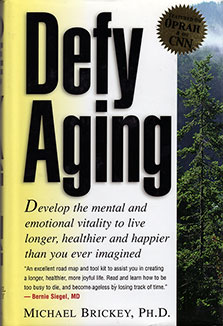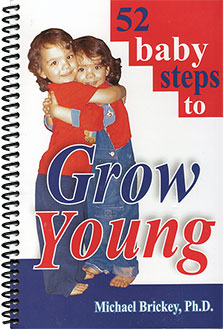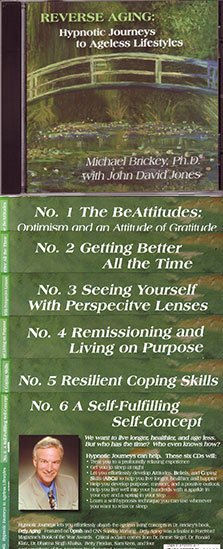The Defy Aging Newsletter
Anti-aging psychology, holistic health, and wellness
These are archives of a biweekly e-mail newsletter for helping you think, feel, look, and be more youthful and live with purpose.
May 22, 2008 Number 188
This issue:
Altruists live longer, healthier, happier lives
Action to take
Appreciate that people who are loving and altruistic are rewarded with longer, healthier, happier lives. Thus being loving and altruistic has an unexpected bonus.
Why
In 2001 philanthropist Sir John Templeton endowed the Institute for Research on Unlimited Love and named his friend, Case Western Professor Stephen Post as its president. I keep thinking that would make an interesting pick line in a bar. Seriously, the purpose of the Institute is to conduct research on love and altruism.
Dr. Post, whom I interviewed on my Ageless Lifestyles radio program, relates that there are several types of research that converge to indicate that people who are altruistic and loving live longer, healthier, happier lives:
1. Studies For example, Alan Luks found that for people who help others, 50% reported feeling a high, 43% felt stronger and more energetic, and 13% experienced fewer aches and pains. Another study found that executives who got bonuses and used them for altruistic purposes were happier than those who used the money for themselves. The same was true for college students given twenty dollars.
2. Longitudinal Studies Here are two examples: Paul Wink periodically followed up high school students for more than fifty years. Those who were generous in high school had better mental and physical health as adults. Stephanie Brown’s five year study of older couples found that those who provided no significant support to others had twice the death rates of those who provided support.
3. Brain Chemistry Studies of brain chemistry found that activities such as volunteering and helping stimulate parts of the brain associated with pleasure.
4. Anger Studies The antithesis of altruism is hostility and anger. Numerous studies have found that angry people are more like to have heart disease (an interesting metaphor) and other health problems.
One study does not make a compelling case. When dozens of well designed studies all point to the same conclusion, the message is as clear as the social sciences get. While virtue should be its own reward, it’s good to know that it has other rewards as well. Dr. Post’s very readable book, Why Good Things Happen to Good People reviews the research and is a wonderful guide for how to be more altruistic and loving in ten areas of your life. I highly recommend it.
Quotes
Be the source of whatever you want in your life.
~Neal Walsh
When you cease to make a contribution, you begin to die.
~Eleanor Roosevelt
Humor
We are all here on earth to help others; what on earth the others are here for I don't know.
~W. H. Auden
Q: What do you give a man who has everything?
A: Antibiotics
Reprint this article from:
THE DEFY AGING NEWSLETTER
Anti-Aging Psychology
Holistic Health and Wellness
This newsletter article may be reprinted in E-zines, newsletters, newspapers, and magazines provided the content is not edited and the attribution below is given. Formatting may be changed and you may use one of the web site pictures of the author to accompany the article.
"Dr. Michael Brickey, The Anti-Aging Psychologist, teaches people to think, feel, look and be more youthful. He is an inspiring keynote speaker and Oprah-featured author. His works include: Defy Aging, 52 baby steps to Grow Young, and Reverse Aging (anti-aging hypnosis CDs). Visit www.NotAging.com for a free report on anti-aging secrets and a free newsletter with practical anti-aging tips."






